Posts Tagged ‘Refugees’
Your Family is Coming: The Long Road to Reunion for Refugees
Everyday, people like Ibrahim make the painful decision to leave their homes due to persecution, conflict, violence, human rights violations and climate-related factors. Their journeys are often marked by loss, separation and worry for those left behind.
For ten years, Ibrahim carried the weight of being separated from his family. This is his story of enduring hope.
An Impossible Decision
Ibrahim was born and raised in the Darfur region of western Sudan. He worked a variety of jobs — housekeeping, construction, office administration — in order to provide for his family. He was married with three children and a fourth on the way.
While Ibrahim loved his home and community, civil conflict left him feeling uneasy and concerned for his family’s safety.
For decades, Darfur has been embroiled in conflict fueled by ethnic disputes and limited resources. In 2003, a rebel group launched an insurrection in Darfur, protesting what they believed was the Sudanese government’s disregard for non-Arab ethnic groups in the region. In response, the government armed ethnically Arab militias to combat rebels in Darfur.
Despite international attempts at peacebuilding and intervention, the conflict worsened. Militias threatened the lives and livelihoods of non-Arab civilians, burned down thousands of villages, committed sexual violence and blocked aid organizations from delivering much-needed food and medical supplies.
In 2013, as a renewed wave of violence gripped the region, Ibrahim made the heart-wrenching decision to flee Sudan, leaving behind his wife and children, in hopes of finding help.
“There was too much killing, too much fighting,” he said. “It was impossible to live.”
Seeking Safety
Ibrahim arrived in Jordan, where he had heard help was available. He registered with the U.N. High Commissioner for Refugees (UNHCR), meticulously completing his paperwork.
“I always wrote my kids’ names as my family on all the papers — all the dates of birth and everything,” Ibrahim said. He wanted to make sure records of his wife and children, still in Sudan, were included in his case so that they too would be resettled in a new country with him.
Ibrahim found work, sent money home to his family and waited.
Two years went by until one day, Ibrahim learned that his case had been approved for resettlement in the U.S. He passed all required security and health screenings, but because his family was still in Sudan, they were unable to travel with him.
With help from the International Organization for Migration (IOM), Ibrahim flew to the U.S. in 2016, where World Relief Triad welcomed him to North Carolina.
Ibrahim remembers feeling like he had escaped death.
“When I arrived, I was so grateful for World Relief because they helped me with everything,” Ibrahim said. “They helped me with a place to stay. They were able to find work for me, and they helped until I felt that I could do things for myself.”
And yet, as Ibrahim rebuilt his life in the U.S., he never stopped thinking of his wife and children, still stuck in Sudan. They frequently spoke over the phone — and Ibrahim continued to hope.
“I couldn’t really rest or enjoy all the blessings I had because I kept on thinking about them all the time,” Ibrahim said. “I never felt complete.”
Hoping and Waiting
Now in the U.S., Ibrahim continued working with IOM in the hopes of bringing his family to North Carolina. He was persistent, calling for updates whenever he could.
With IOM’s help, he was eventually able to secure interviews for his wife at the U.S. embassy in Khartoum, the capital of Sudan. Still, the process crept forward slowly.
Then, in 2019, just when everything finally looked ready to move forward, Ibrahim encountered another obstacle — the president of the United States announced a new executive order banning Sudanese people from traveling to the U.S., Ibrahim’s family included.
Ibrahim remembers being told, “Everything is correct, all the papers are the way they’re supposed to be. There’s just some rules that they’re not allowing people.”
He began to doubt whether he would ever see his wife and children again. “I almost lost hope,” he said.
But then, in 2021, he got a call. A new U.S. presidential administration had reversed the executive order. Over the phone, he heard the long hoped-for words: “Your family is coming.”
Ten years after Ibrahim had to leave his family behind in search of safety, after years of hoping and waiting, they would be reunited at last.
Reunited
In February 2022, Ibrahim gathered with staff and volunteers from World Relief Triad at the airport to welcome his wife and four children to North Carolina.
“I broke down in tears because I hadn’t seen them in 10 years, and now they’re here, and it’s real,” Ibrahim said.
“The little one that I left was only three months; when he came, he was 10 years old. I cannot describe how I felt because I never thought — I was at the point of thinking maybe I will never see them again.”
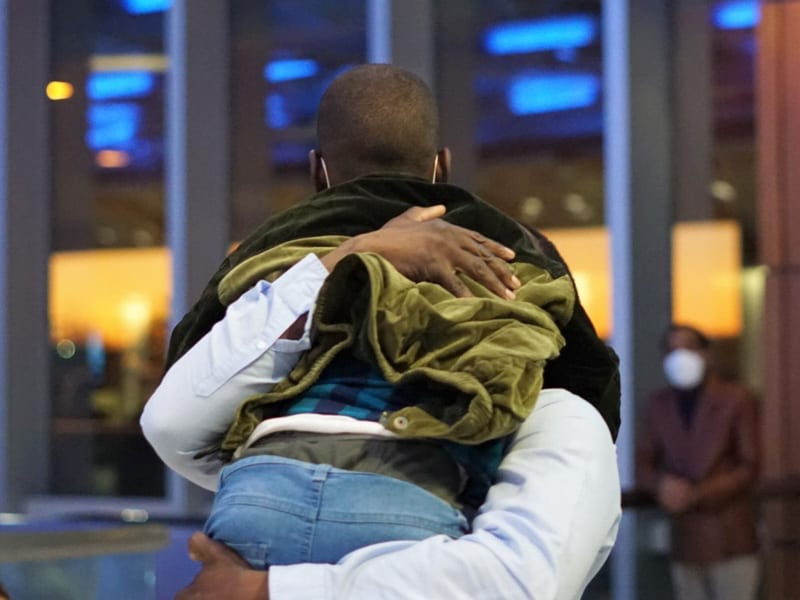
Now, with his family finally together again, Ibrahim has new hopes.
“My hopes are for my kids,” he said. “For them to get the right education, for them to be able to be good people. I want them to make something for themselves and make me proud… for them to benefit themselves and our new country — the United States.”
Remembering Those Left Behind
Even as Ibrahim and his family continue building their new life together in the U.S., Darfur and the family, friends and neighbors they had to leave behind are never far from his mind.
“People are really suffering there. They don’t have food, they don’t have water, they live in very unsafe, unhealthy conditions,” he said.
The UN estimates 2.5 million people are living in displacement camps across Darfur, and 6.2 million people will need humanitarian assistance in the region within the next year. The same factors — war, violence and persecution — that drove Ibrahim and his family from their home are still impacting people in Sudan today.
At World Relief, we recognize that addressing the drivers of mass displacement requires a multi-faceted and holistic response. In Sudan, World Relief is on the ground providing humanitarian assistance and investing in development and peacebuilding efforts to address the underlying factors contributing to conflict and displacement.
Building a just world means coming alongside families like Ibrahim’s once they’ve reached the U.S. and it means finding lasting solutions to the problems that force families to flee in the first place.
For Ibrahim, his hope for safety and brighter futures for those still in Darfur endures — “I really would like for them to… have a better life for themselves and for their kids.”
Together, we are taking action, hoping and praying for lasting solutions for displaced and separated families like Ibrahim’s both in the U.S. and in countries around the world.
Across the U.S., local World Relief offices rely on partners and volunteers like you to help build welcoming communities. Join them on the path to hope, transformation and lasting change alongside refugees and immigrants like Ibrahim.

Kelly Hill serves as a Content Writer at World Relief. She previously served as Volunteer Services Manager at World Relief Triad in North Carolina before moving to Salt Lake City. With a background in International and Intercultural Communication, she is passionate about the power of story to connect people of diverse experiences.
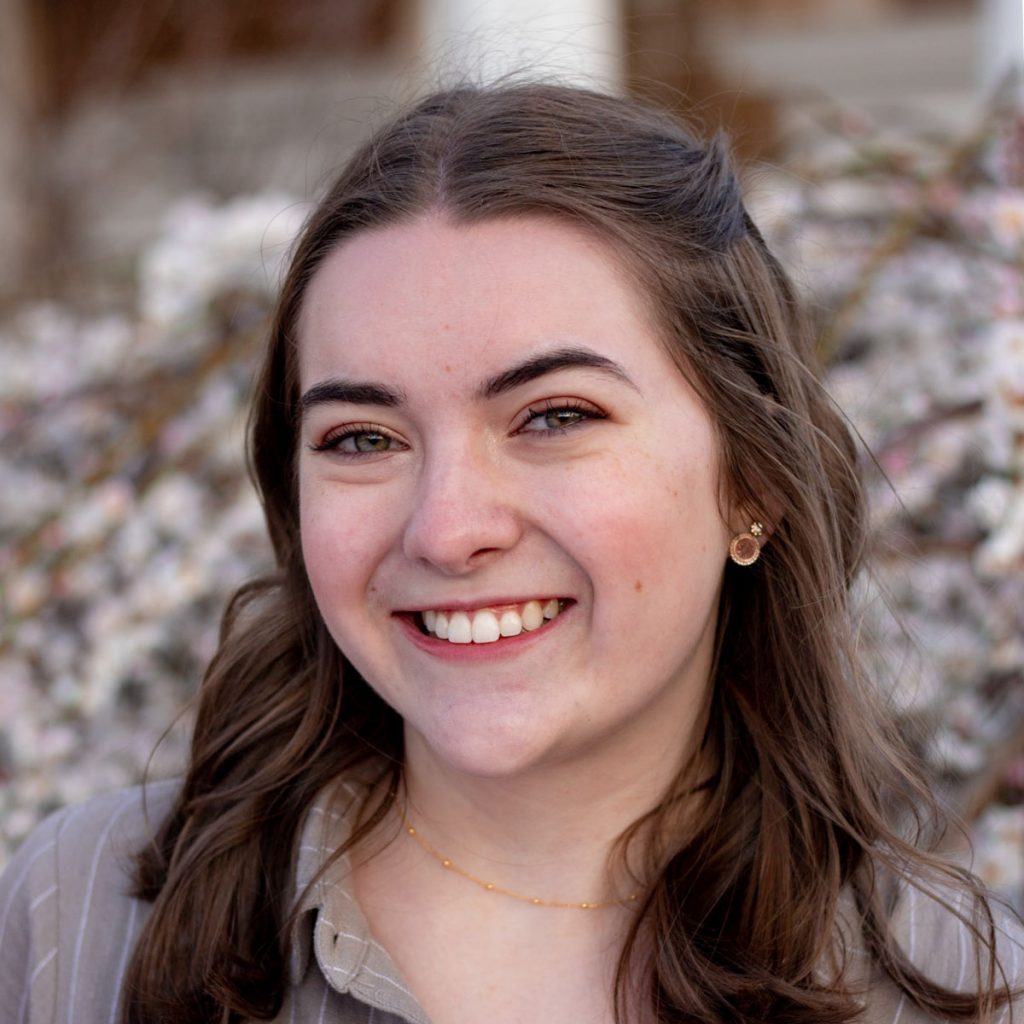
Abby Ray has been serving as the Communications & Advocacy Coordinator at World Relief’s Triad office since September 2021. She works to amplify the voices of clients, staff and community members by empowering them to share their own stories.
20 Ways to Learn More About Refugees
Around the world, 103 million people have been forcibly displaced from their homes — the highest number in recorded history. Of those, 32.5 million are considered refugees, having fled across an international border due to war, violence, conflict or persecution.
That’s millions of mothers and fathers, daughters and sons, teachers, doctors and friends — each created in the image of God — with full lives and identities long before they became refugees.
As we enter World Refugee Awareness Month and look toward World Refugee Day on June 20th, we’ve compiled a list of books, podcasts, videos and more to help answer your questions about refugees. As you engage with and share these resources, we hope you’ll be inspired to join us in creating a world where everyone can thrive.
READ
Some advocates have described Jesus as a refugee. But was he really? World Relief CEO Myal Greene tackles that question and how the answer should shape the Christian response to refugees and other vulnerable immigrants.
Blog: Drivers of Mass Displacement
People are displaced from their homes for myriad reasons, including persecution, conflict, violence, human rights violations and climate-related factors. World Relief’s Lydia Dawson explains the drivers of mass displacement and how World Relief is responding globally.
Blog: Worth the Wait: A Story of Faith, Perseverance and Love, Despite the Odds
For seven years, Congolese refugees (and newlyweds!) Mbimbi and Goreth didn’t know if they would ever see each other again. Read their story to learn more about the challenges and uncertainties that many refugees face as they rebuild.
Book: Inalienable: How Marginalized Kingdom Voices Can Help Save the American Church
U.S. churches are at a critical crossroads — blurred lines between discipleship and partisanship have compromised our witness and confused our national and individual responses to refugees and “the stranger.” In their book, pastor Eric Costanzo, missiologist Daniel Yang and World Relief’s Matthew Soerens find hope in the witness of global Christians, the poor and the ancient church.
Book: Beyond Welcome: Centering Immigrants in Our Christian Response to Immigration
Karen González invites Christians passionate about serving immigrants to explore how we can create welcoming communities that put our immigrant neighbors at the center of the conversation.
Book: Everything Sad is Untrue: (a true story)
Following his mother’s vocal embrace of Christianity, Daniel Nayeri, his mother and his sister were forced to flee Iran. In this memoir, he retells the tales of his family’s history from his perspective as a misfit middle schooler in Oklahoma.
Book: The Girl Who Smiled Beads
When Clementine was six years old, she and her 15-year-old sister, Clair, fled the massacre that was happening in their home country of Rwanda. In this riveting memoir, Clementine tells their story of rebuilding and reclaiming life on their own terms.
LISTEN
This World Relief mini-series offers a global and a biblical perspective on the subjects of immigration, mass displacement and refugee resettlement, diving into current policies and practices and sharing stories of our collective human experience.
This six-part series traces the U.S. refugee resettlement journey through the eyes of those directly experiencing it. Follow along as each episode brings the listener into the daily lives of refugees adjusting to life in the U.S.
Podcast Episode: Holly Andrews on How the Church Can Walk Alongside Refugees
In episode 4 of our Forward Together podcast series, Holly Andrews explains how churches can use the resources they already have to help refugees and other immigrants rebuild their lives.
WATCH
TEDx Talk: One Refugee’s Life Experience | Come Nzibarega
Born and raised in Burundi, Come Nzibarega shares his story of escaping torture and civil war and why he thinks refugee camps are the richest places in the world.
For Ibrahim’s family, the road to resettlement, reunion and rebuilding has been long. Learn more about the obstacles families like his can face as they seek safety.
Video: Who are Refugees and How Do They Arrive in the United States?
From flight and displacement to arrival and integration, this 7-minute animated video tells the true story of a refugee family’s experience in each stage of the refugee resettlement process.
STUDY
World Relief Workshop Course: Intro to Resettlement
Have you ever wondered what actually happens in the resettlement process or what a resettlement agency does? This FREE, 45-minute course will answer those questions and explain how you and your community can support refugees resettling in the U.S.
World Relief Workshop Course: Navigating Friendships
Navigating friendships with those who are different from us can be rewarding — and challenging! In this self-paced, online course you’ll learn essential skills for building empowering, long-lasting friendships with those who may differ from you in culture, socioeconomic status and religion, and best practices for supporting a friend who lives with trauma. During the month of June, enroll for 50% off with code WORLDREFUGEEDAY50.
Bible Study: Christ Like Welcome
Jesus astonished the culture around him by giving voice to the speechless, frustrating the powerful and humbling the wise. In this 5-week study from our partners at Women of Welcome, learn how your welcome can become like his — wonderfully surprising, deeply challenging and firmly rooted in love.
Bible Reading Plan: The I Was a Stranger Challenge
Take the challenge and discover God’s heart for those who have been displaced. Over the course of 40 days, read one Bible passage a day that speaks to God’s love for foreigners and refugees.
FOR THE WHOLE FAMILY
Children’s Book: Marisol’s Dress
In the midst of a revolution, young Marisol is forced to flee the life she knows and loves in vibrant Cuba. In this beautifully illustrated book, Emily Ozier follows her mother and grandmother as they journey to the U.S., facing challenges and celebrating along the way.
Children’s Book: My Two Blankets
When Cartwheel moves to a new country as a refugee, everything is strange: the animals, the plants, even the wind. An old blanket comforts her when she’s sad, and a new blanket just might change her world. A story about leaving home, arriving in a foreign land and finding a new friend.
For parents and teachers wondering how to talk about mass displacement with children and teens, the UN Refugee Agency offers teaching materials on refugees, asylum and migration, as well as guidance for teachers working with refugee children in the classroom.
Are you ready to take the next step towards creating a more welcoming and just world for refugees and other vulnerable immigrants? Learn how you can join us today.

Karen Spencer is World Relief’s U.S. Marketing Partner and serves U.S. offices in the area of identity and messaging. She previously served as Mobilization Director for World Relief in Memphis, where she lives. She is a connector of people, places, passions and purpose.

Kelly Hill serves as a Content Writer at World Relief and previously served as Volunteer Services Manager at World Relief Triad in North Carolina. With a background in International and Intercultural Communication, she is passionate about the power of story to connect people of diverse experiences.
From Welcomed to Welcomer
At the end of April, World Relief will celebrate National Volunteer Appreciation Week, a time to recognize the impact and power of volunteers to “tackle society’s greatest challenges, build stronger communities and be a force that transforms the world.”
Last year, World Relief engaged 8,430 volunteers and 873 church partners in the U.S. to welcome and walk alongside their refugee and immigrant neighbors. Today, Todun Afolabi, World Relief’s U.S. Volunteer Engagement Manager, shares her own journey from welcomed to welcomer.
The Ministry of Welcoming
When I think about God’s heart for welcoming strangers, I think of Ruth and Naomi’s story in the Bible.
Naomi was the mother of Mahlon, Ruth’s first husband. Naomi’s family had traveled to Moab because of famine in Judah. While displaced from their homeland, Mahlon met and married Ruth, a Moabite. But when Mahlon and his father died, Ruth and Naomi returned to Judah as widows.
Naomi knew what it was like to be a stranger in a foreign land, and she was instrumental in helping Ruth resettle in Judah. She showed her how to secure food and, eventually, even connected her with her future husband, Boaz. Through Naomi’s care and advice, Ruth was able to establish a new home.
Needing a Naomi
For me, welcoming newcomers is ministry — and it’s personal.
When I was a stranger in a foreign land, there were many “Naomis” who spoke into my life and helped me adjust to my new home. I’ve learned that you can’t downplay the role of God in your life, especially in how he connects people and brings them together.
In 2011, my husband and I came to the U.S. from Nigeria as newlywed graduate students. As a couple, we couldn’t stay on campus, so we found a small apartment. At the time, we didn’t have enough money for furniture. We were just glad to have a roof over our heads.
We soon started attending a local church, and one of the pastors asked how we were adjusting and if we needed anything. I was hesitant to acknowledge how little we had and how far from home we felt, but we couldn’t hide our needs.
Later that week, I was amazed when the pastor called and asked if we were home. Within minutes, this truck drove up with chairs, a table, a dining room set — everything needed to make the apartment into a home for us.
That was the first of many ways the church surrounded us and helped us through our early years in the U.S. — and as a married couple! Our first car was donated to us by the church. They helped us cover rent expenses when money got a little too tight. When I got pregnant with our first child, they bought maternity and baby clothes and celebrated with us when our son was born.
I think God allowed me to experience the church’s welcome first-hand so I could understand how important it is. They showed us the heart of Christ. Now in my position at World Relief, that same heart motivates me to help others welcome newcomers the way I was welcomed.
Becoming a Naomi
When I joined World Relief as the Chicagoland Church and Volunteer Coordinator in Dupage-Aurora in 2018, it was an opportunity to become a Naomi for others.
I remember meeting a young woman who had recently arrived in the U.S. from Rwanda, and I was telling her my story — how I came and what had happened in my life since. She told me, “If you can do it, then I can,” and I said, “Yes! It’s possible. It’s really possible!”
It’s powerful to see that lightbulb go off, to see the encouragement and the hope that comes when someone realizes that they can do this — and that they don’t have to do it alone. That’s why I’m so passionate about helping the welcomers know and express the heart of God for strangers.
I wanted to keep bridging the gap between churches, volunteers and newcomers not just in Chicagoland, but across the country. In 2021, I transitioned to a role with World Relief’s Home Office as the U.S. Mobilization Specialist and now, I’m the U.S. Volunteer Engagement Manager.
In each of these roles, I’ve seen the mutual transformation that happens when churches and volunteers work together with their newcomer neighbors to welcome them — just like I was welcomed.
Welcome is for Everyone
At World Relief, we want to make room for everyone to be a part of welcoming newcomers, and I’m especially excited to invite those who have immigrant stories like me to volunteer with us. We can play an important role in being Naomis to our new neighbors, helping them adjust and adapt, just like we did.
It was a Naomi in my life who introduced me to volunteering. I started helping at a local food pantry and discovered that it was a good way to give back, but also an opportunity for me to build relationships and integrate. I realized it was a way for me, as an immigrant, to say, “This is my community now, too.”
I’ve learned that — whether you’re an immigrant, refugee, asylum seeker, a church partner or anyone else in the community — you have something to give. Even if it’s an hour a week or giving someone a ride to an appointment, those things really have an impact. I know because they had an impact on me!
Volunteering is where we get to bridge the gap between the heart of Christ and the needs of our community.
I look at my experience and see God’s hand in all of it — in the way I was welcomed and the way I now get to help others welcome. I’m grateful for this ministry God has given us at World Relief, and I’m grateful to have churches, volunteers, neighbors and people like you ministering together with me.
Do you want to create lasting change alongside passionate, mission-driven coworkers like Todun? World Relief is growing our team to meet the increased needs of our world, and we’re looking for people like you to join us.

Todun Afolabi joined World Relief in 2018 and currently serves as the US Volunteer Engagement Manager. With a background in law, she is passionate about humanitarian efforts and engaging communities in their stories of change.
Photo Essay: The Afghan Seamstress Sewing Beautiful Garments in Her New Community
Meet Samira
On a cold day in the middle of Illinois winter, the home of Samira* and her family has vibrant colors. Though the family only arrived in the U.S. a few months before, they have been busy. And much of what Samira has done is create. This photo essay showcases the beautiful garments that Samira makes.
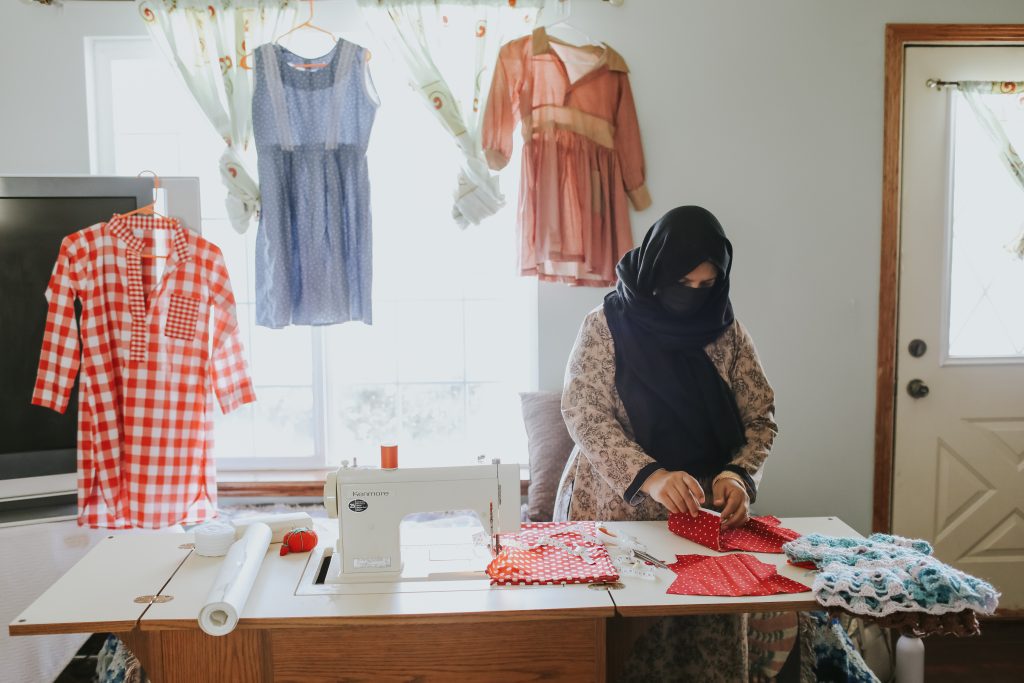
In Afghanistan
In her home community in Afghanistan, Samira* was a gifted seamstress. With her skills in sewing and crocheting, she crafted gorgeous wedding gowns, dresses, and other apparel.
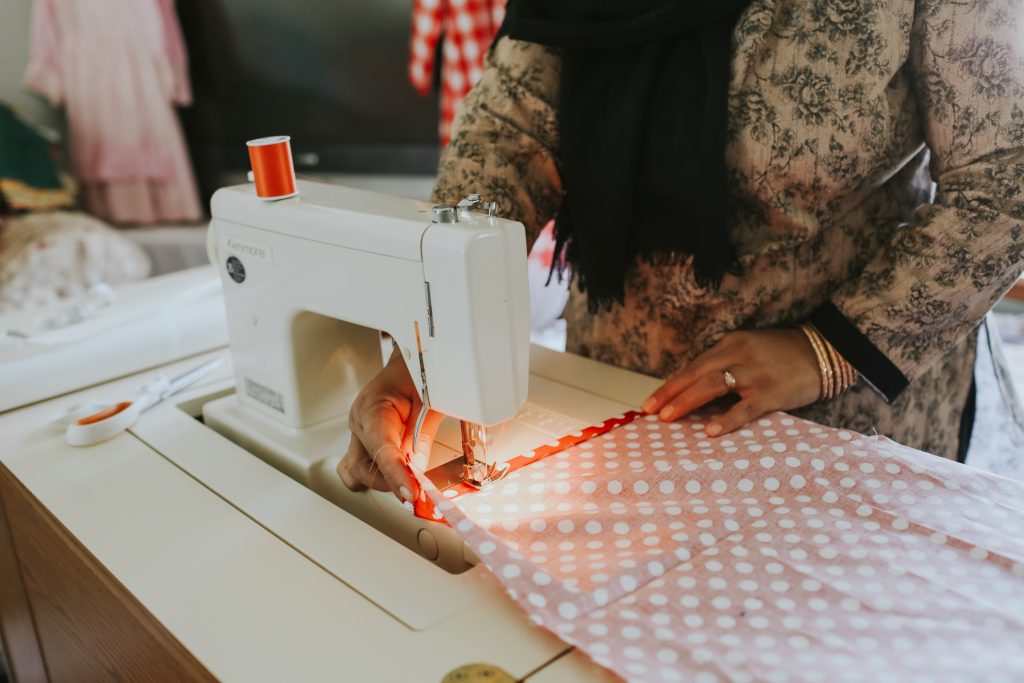
The days of making wedding dresses for friends and relatives in her hometown in Afghanistan are long gone. Today, they are documented only through a few photo prints.
On the Journey
Samira carried those photos with her when the family Afghanistan. They came with her to the U.S. military base where her family awaited resettlement. And now, in their new home in the suburbs of Chicago, Samira looks at her photos as mementos of a life left behind.
But even on their family’s journey, Samira found ways to use her talent and scarce resources to meet her family’s needs. She transformed a bedsheet into a dress for her daughter. She made yarn by hand from spare materials.
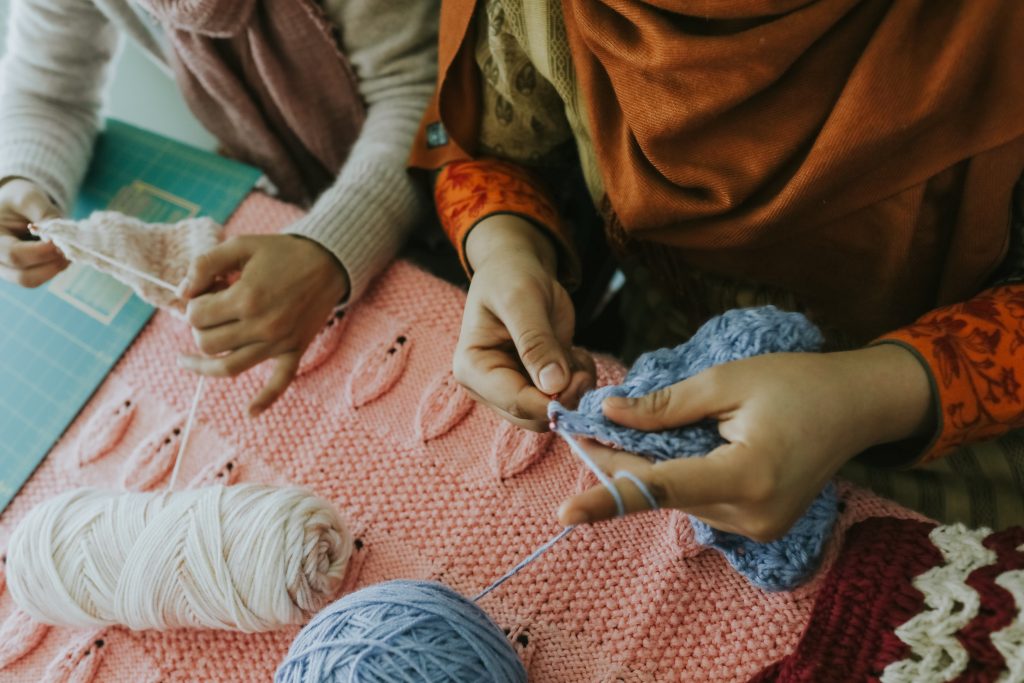
In a New Community
When World Relief Chicagoland welcomed Samira and her family to Illinois, staff learned of Samira’s skill as a seamstress. Thanks to the generosity of our supporters, she gained a sewing machine, fabric, thread, and other sewing tools. Now, she uses her skills to create a home and support her family in the United States.
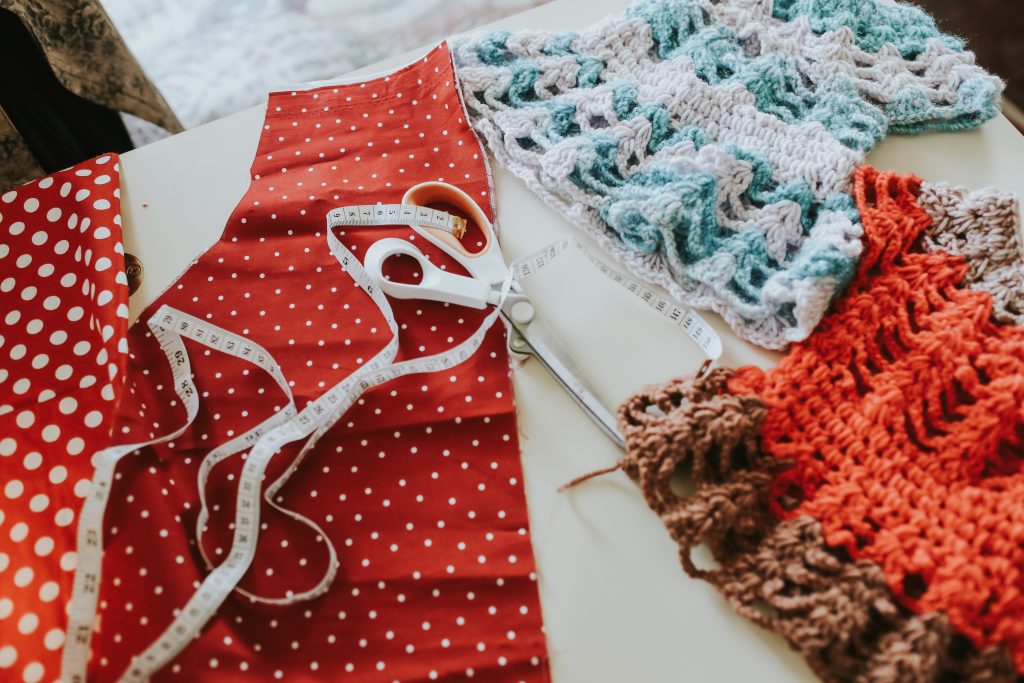
The next time World Relief Chicagoland staff saw her, Samira and her daughters were wearing brand-new dresses sewn just that week!
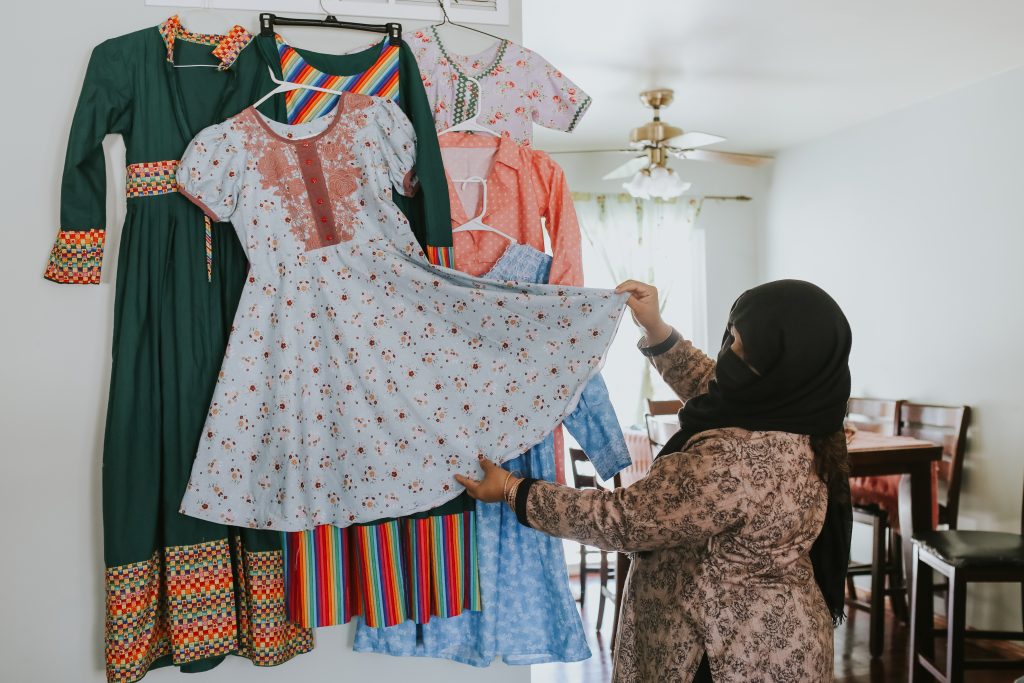
In her home, during cold Chicago winter, Samira crochets scarves, gloves, and hats. She and her daughters sew dresses. And while Samira left so much behind, now she creates beauty in her new community.
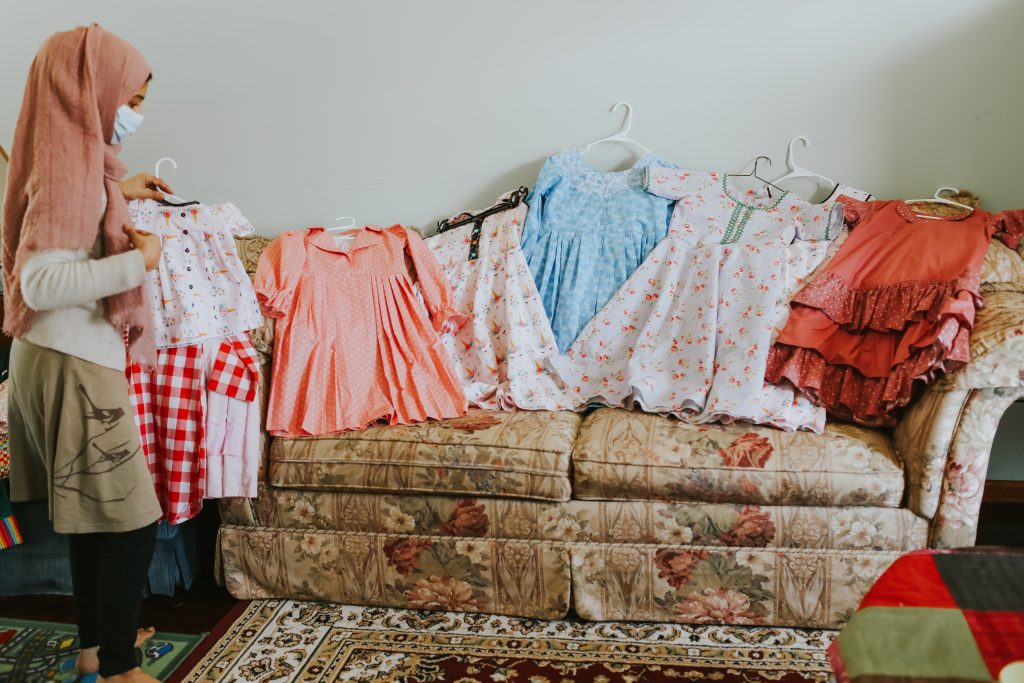
Images in this photo essay by Roxanne Engstrom of Hawa Images.
Read More
World Relief Chicagoland’s 2021 Year in Review is an annual report that features Samira’s story along with other stories of hope.
Click here to read the Year in Review.
As you read, we hope that reflecting on the year behind us inspires you. And that it reminds you of the power of creating welcoming community together.
Welcoming the Welcomers: One Afghan’s Journey to the U.S.
As World Relief continues to resettle Afghans who were evacuated from Afghanistan, we are reminded that resettlement often comes with both grief and gratitude.
For Afghans like David, resettling in North Texas has been an immense gift of safety, security and community. And yet, he feels the heartache of leaving his home and extended family behind. We are grateful to David for sharing his story with us today.
A Culture of Hospitality
“The most important thing to know about Afghans is, whenever a guest comes to our house, we’re happy for it,” David said. “We say that guest is not only our guest, it’s God’s guest that came to our house.”
David had just finished assisting the World Relief North Texas (WRNT) team with a cultural orientation for Afghans who had recently resettled in the area.
As an Afghan and newly arrived immigrant himself, his knowledge of both Afghan and American culture had quickly become a vital asset to the North Texas team in welcoming the influx of Afghan refugees who were arriving.
“I did work for the Americans for 19 years straight,” he said. “I know most of the cultures and how things work because if you work with someone from their country for 19 years, you get to hear a lot of stuff and you get to share your experience with them.”
The Day Life Changed
David, along with his wife and three children, was one of the 53,000 Afghans who were evacuated out of Kabul when it fell to the Taliban in August.
Growing up in Afghanistan, David’s father worked as a soldier for the Afghan special forces in Kandahar. Two of his brothers also worked for the coalition forces, and in 2002, shortly after the U.S. launched an attack against the Taliban, David began working with the U.S.
State Department as a translator.
The day the Taliban took Kabul, David was at work, and life changed dramatically for him.
“I had friends in town,” he said. “They called me that day and said, ‘You heard Taliban is in the city? People are running left and right and they’re just scared and don’t know what’s going to happen after this.’”
When he got off the phone with his friend, he quickly went to his supervisor and informed them of what was happening. At first, no one believed him. They thought it was impossible for the Taliban to take over so quickly, and while David agreed that it seemed unbelievable, the truth soon became clear.
The Rush to Get Out
Over the next three days, David and his colleagues — Afghan and American alike — worked tirelessly to get rid of as much ammunition and military equipment as they could so as not to leave it in the hands of the Taliban. On the fourth day of his shift, though, David was told to go home, get his family and bring them back.
“They told me, ‘bring your kids, wife, that we need to evacuate you guys as soon as possible from Kabul,’” David said. “I asked them, ‘what about my other family? Like my mother or my brother?’
“They said, right now the only thing they could do is me and my wife and kids. They said they could get the rest of my family in the future, but right now, I needed to bring my wife and kids back to the base.”
David left work and drove back to his house. When he arrived, he and his wife packed everything they could into two bags.
“I had only three hours to prepare and we took all the necessary stuff that we needed from the house and made two bags and brought it with us,” he said.
When David and his family returned to the military base, they boarded a plane and left Afghanistan. Though they were now physically safe, the life they knew had been left behind.
Journeying to the U.S.
Over the next few days, David and his family made an exhausting journey across the globe. They spent one night in Qatar before flying to Germany where they stayed on a U.S. military base for seven days. David said that living conditions on the base were not great, but that he didn’t blame anyone for the poor conditions. How could he when no one ever expected to have to house so many people with such short notice?
From Germany, David flew to D.C. where he and his family went through customs and border security before finally landing in El Paso, Texas where they would live on another U.S. military base for 30 days.
The two bags they had packed, however, didn’t make it.
“When we got to Qatar, they took our bags,” David said. “They said the first priority was to get us out from here, and then it’s the bags… For 20 days, we had to wear the same clothes and after 20 days, we finally got to take a shower and change clothes. They took our bags and I still haven’t received them.”
While living conditions in El Paso were better than they were in Germany, life was still difficult. David and the other Afghans had to sleep in tents and wait in hours-long lines to get their food each day.
“I don’t blame them because in the camp where we were it was more than 10,000 people,” David said. “It’s not easy to give food to 10,000 people, three times a day, breakfast, lunch, dinner.”
Each morning, David and several other Afghans would meet with leaders at the U.S. military base hoping for some update as to when they would be released from the base and resettled in a new home.
“We were not hearing good news,” David said. “All we were hearing was that we would have to stay here for longer and longer.”
His young kids were becoming restless, often wishing they had stayed in Afghanistan, believing that life was better there. While David tried to comfort them, he too was becoming impatient with living in a tent on a military base.
Eventually, he decided to take matters into his own hands.
Beginning Again
Prior to the fall of Kabul, a few of David’s friends and family had been resettled by World Relief North Texas. It was through those friends that David heard about World Relief.
“I called [my friend] and said, ‘Please talk to Jonathan (WRNT Program Manager). If it’s possible to get out from this camp…I don’t want to wait. It’s taking too long.’”
David began making arrangements to leave the military base. He got copies of the necessary paperwork and medical records, booked plane tickets for his family, and left El Paso for Fort Worth. They spent their first night in Fort Worth at David’s cousin’s house, but the following day, Jonathan called David to say that an apartment was ready for them.
“He got the apartment ready in two days. It was amazing,” David said. “I couldn’t believe they helped us so much. They brought food, furnitures, beds for the kids, everything. Everything was in the house like a family living already.”
David said that walking into the house was like taking a deep breath. His children were thrilled and immediately began asking about when they could go to school.
Over the next few days, World Relief caseworkers helped get David’s kids enrolled in school. David’s wife purchased fabric and began sewing herself new dresses since their bags remained lost. David began volunteering with World Relief, acting as a translator and liaison with new Afghans as they arrive in North Texas.
“I told Jonathan the other day if he needs help as a culture-wise, I know more about Afghans, how to provide good relations, and help and stuff. I’m always ready to help them.”
While David and his family are working hard to settle into life in the U.S. — applying for social security, getting a drivers license and working with World Relief to get their SIV case approved — the toll of the last few months still weighs on them and the other Afghans in their community.
“What we are requesting from you guys to just please be patient… Most of our people have done or have been through a lot of difficulties in Afghanistan and have given a lot of sacrifices when the U.S. military was in Afghanistan. Most of the people lost their brothers, their father, their families in what was going on in Afghanistan.”
You Can Help
Many Afghans, including David, still have family in Afghanistan who are trying to get out. They wait urgently for an update, and we wait and pray with them.
As World Relief works alongside the U.S. government to continue resettling Afghans like David, you can help. You can:
Pray: Pray for David, his family and others like them as they build a new life in the U.S. Pray also for the Afghan allies and civilians who are still seeking safety. Pray for World Relief Resettlement Staff as they work tirelessly to receive refugees as they arrive.
Advocate: Call on Congress to do everything in their power to evacuate as many as possible and resettle Afghan refugees. Together, we can stand with those who are suffering and influence our nation’s leaders to help vulnerable people around the world and in the U.S.
Give: You can respond to urgent crises, welcome immigrants like David and promote peace and justice across the globe by giving to World Relief today.
It takes all of us to build communities of love and welcome that we all feel proud to be a part of. Thank you for moving with us.

Rachel Clair is a Content Manager at World Relief. Alongside an amazing team of marketing colleagues, she manages the curation and creation of written and multi-media content for World Relief’s global platforms. With more than 10 years of experience creating content for churches and non-profits, she is passionate about developing stories that challenge individuals and communities to lean into all of whom God created them to be. She holds a BFA from Stephens College and is currently pursuing a certificate in a Spiritual Formation at the Transforming Center in Wheaton, IL.
Watch this Family Reunite After 9 Years Apart
Why Family Reunification is Needed
Can you imagine fleeing your home? And not just leaving behind your community. Becoming separated from your family too.
Sadly, the circumstances that push refugees from their homes often separate families. And this creates countless hardships. Sometimes there are tragic consequences. The loss has a lasting emotional impact that affects other areas of life. In other words, it can prevent families from integrating into their new communities.
Thankfully, the United Nations refugee agency (UNHCR) sees family as a primary community, for every person. Because of that, UNHCR prioritizes family. Together, UNHCR and organizations like World Relief work to reunite husbands and wives, bring together parents and children, and connect children with their siblings. Above all, to restore relationships.
UNHCR promotes family reunification to protect and preserve the unity of this fundamental unit of society, to restore basic dignity to a refugee’s life, and especially to provide protection for children…
UNHCR
The Barriers to Reunification
However, the journey can be long. And it’s challenging. There is often an extensive waiting period after someone submits their application. Loss of formal documents can make it difficult for families to prove their relationships. Additionally, it can be expensive. Airfares, legal fees, and other costs add up. It can end up being thousands of dollars that families can’t afford. Beyond those costs, it can be hard to find affordable legal advice. Because of that, too many families go years without seeing each other.
But there is hope.
How World Relief Reunites Families
Every year, World Relief works to bring families back together. By providing free or affordable legal help, staff walk families through the whole process. First, staff can evaluate the case for reunification. Then help with submitting the application. They can sift through the required documentation. Then case managers can help with resettlement details. Finally, World Relief volunteers can even provide a ride to the airport. All of this can take years!
But it’s worth it to bring families back together.
Then when they are, it’s always an emotional experience.
Watch the video below to see one family’s emotional reunion at the airport.
Watch more videos of hope on World Relief Chicagoland’s YouTube channel!
More like this:
New Opportunity in the U.S.: Jenny’s Story
I Was No Longer Safe in My Country: Yomardy’s Story of Seeking Asylum
Three Stories of Welcoming Refugees Across the U.S.
Did you know that World Relief Chicagoland is just one office location among 17 other U.S. offices of World Relief? As we welcome refugees and serve immigrants throughout the Chicago area, we know that across the country, other offices are doing their part to welcome new arrivals to their cities! Each shares a vision for creating communities where immigrants and refugees thrive. And each has powerful stories to share of the people who come to the U.S. after leaving their home country.
The three stories below are from World Relief offices in Washington state, Memphis, Tennessee, and North Texas. Each features a courageous and resilient family. Each family experienced a tragedy that forced them to flee. And yet each story also shows evidence of hope and a future ahead.
Amira admits, “I never expected to be a refugee.“
For Amira, life felt almost perfect… then the United States invaded Iraq and her life changed forever. She started as a top student studying linguistics. Her work and research made her a university professor. She was surrounded by family. Even after the U.S. invasion of Iraq, Amira stayed for three years. She wanted to rebuild her country. But then it became too dangerous to stay…
Read Amira’s story of coming to the U.S. from Iraq as a refugee and about how today, she speaks up as an advocate for refugees and caseworker with World Relief Tri-Cities in Washington state.
Nazia worries for her friends and family in Afghanistan. “It’s not one person, two people, not even one hundred—it’s more like a million people.”
When Nazia, her husband, and three children arrived in Memphis in 2019, they came with the hope of providing a safe future for their daughters and son. Because Nazia’s husband worked on special projects for the U.S. and Nazia worked for Western media, their whole family had been at risk in Afghanistan. Threats from the Taliban forced the family from their home. Seeking safety, the family sold their belongings and traveled to the U.S. on Special Immigrant Visas. In 2019, they arrived in Memphis, Tennessee, where the long work of rebuilding their lives began.
Read Nazia’s story about how World Relief Memphis is helping her family as they dream of their future in the United States…while mourning and praying for their home country of Afghanistan.
David says that the most important thing to know about Afghans is that “Whenever a guest comes to our house, we’re happy for it. We say that guest is not only our guest, it’s God’s guest that came to our house.”
At World Relief North Texas, David practices his culture’s value of hospitality. As an Afghan immigrant, he uses his knowledge of both U.S. and Afghan culture to help the World Relief North Texas team welcome the influx of people arriving from Afghanistan. David and his family escaped Afghanistan in August, so he easily recalls the rush to flee to safety. And he remembers World Relief’s welcome to his family just a few months ago.
Read David’s story of how his experience working with Americans in Afghanistan as a translator is helping welcome other new arrivals to the U.S. through cultural orientation while his own family adjusts to life in Texas.
Read More Stories of Hope
María’s Story: Letter from a New U.S. Citizen
Jerome’s Story: Becoming A U.S. Citizen After Escaping Violence
Reflections on 2021 from Executive Director Susan Sperry
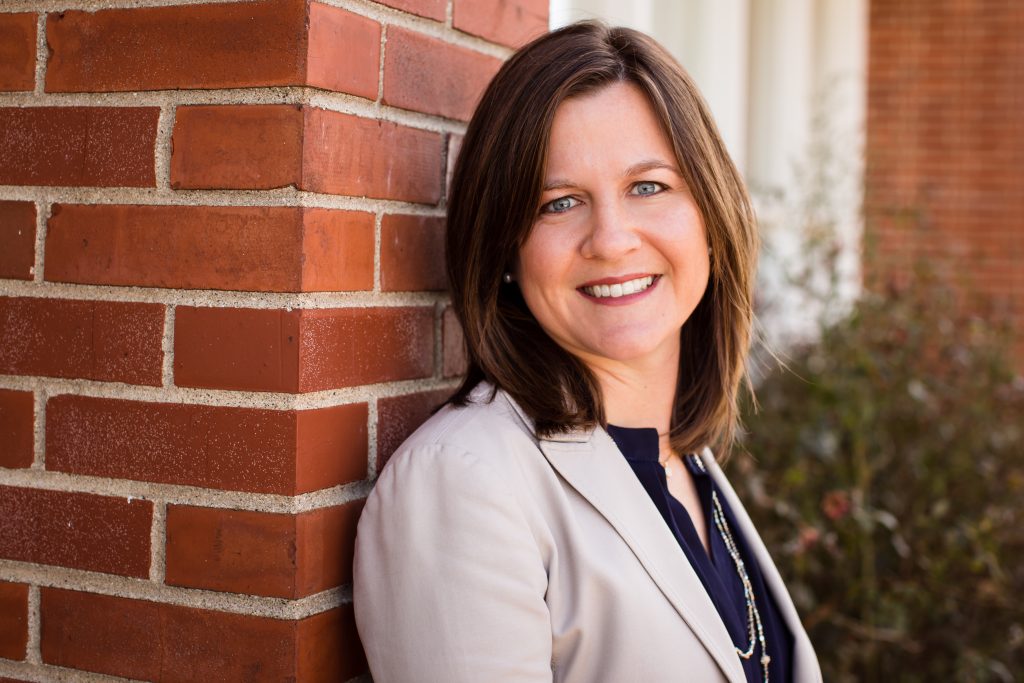
The following letter is from Susan Sperry, World Relief Chicagoland’s Executive Director, who oversees World Relief’s work across three offices in Aurora, Chicago (Albany Park), and DuPage County (Carol Stream) and shared her leadership reflections at the close of 2021. Read more of Susan’s thoughts by following her on Twitter!
To all of World Relief Chicagoland’s generous supporters, partners, volunteers, and advocates,
As I reflect on 2021, I want to share my heartfelt thanks for each of you. I am continuously inspired and amazed by how you, a community of faithful volunteers, partners, supporters, and advocates, show up to love our immigrant and refugee neighbors well. You give your time, talent, material resources, and of yourselves.
Our Shared Calling
In Matthew 25, Jesus directly links himself with people in vulnerable situations. He tells the disciples that when they welcome the stranger, they welcome Him. For those of us who follow Jesus, this call is for us to recognize the image of God in all people. It asks us to see that when we welcome refugees and other immigrants in tangible ways, we welcome Jesus.
For I was hungry and you gave me food, I was thirsty and you gave me drink, I was a stranger and you welcomed me.
Matthew 25:35 (ESV)
You Answered the Call in 2021
In 2021, we saw you answer this call again and again.
- You helped World Relief Chicagoland welcome more new arrivals than in the previous two years combined. Together, we began new relationships that will continue as we walk with families for years to come.
- You mobilized family members, churches, and workplaces to generously share the essentials that newly-arrived refugee families need when they start to rebuild their lives.
- You volunteered – showing up on Zoom calls, in church gymnasiums, at apartment complexes, and to airport pickups. And by showing up, you offered friendship to our new neighbors and contributed to creating a community of welcome.
This year, the Abadi* family arrived in the U.S. unsure of how they would be received. They knew that in many ways, their home country, religion, and ethnicity would set them apart from their new neighbors. And yet you showed up to welcome them. You provided furniture, household essentials, and helped set up their new apartment. When the Abadis went to take a tour of the school their children would attend, students walked up to greet their new classmates. The teachers welcomed them warmly.
These small actions of students and teachers walking alongside the Abadi family reflected the power of community and of coming together to welcome and help one another.
Though rebuilding a life in a new country is never easy, the Abadis marveled, “We never expected a welcome like this.”
Thank You
In these and so many other ways, we saw you give generously. You brought your creative ideas to the table. You committed to welcoming immigrants and refugees in Chicagoland and beyond.
I am humbled by the ways that you have joined World Relief Chicagoland to serve families in vulnerable situations. And I am abundantly grateful to partner together with you in this work. Thank you. As we move forward together into 2022, I pray that we continue stepping into many opportunities to love and serve our neighbors. And that we can receive and reflect God’s love in vitally important ways.
Along with the entire staff of World Relief Chicagoland, I wish you and your loved ones a peace-filled season and new year.
Susan Sperry, Executive Director of World Relief Chicagoland
*The name of the family in this story was changed to protect their privacy.
4 Ways to Read, Watch, and Listen to Powerful Immigrant and Refugee Stories
At World Relief, we love to bring you inspiring and meaningful stories about the immigrants and refugees arriving in Chicagoland. Yet we are all part of an even bigger story – of migration, change, poverty, and global factors that impact all of us. To give you insight into this bigger story, we put together this list of four resources in varying formats – podcasts, a film documentary, a book and articles. Each one gives the audience the chance to see the bigger picture through the eyes of immigrants and refugees. We hope these stories move your heart and that you feel inspired to join the work needed to create a better future.
Podcasts
This American Life, “693: Abdi the American”

What is it? This podcast episode from This American Life returns to a story from years prior of Abdi, a Somali refugee living in Kenya, who won a visa lottery to come to the U.S. as a refugee. And before he can make it to the United States, the police start raiding his neighborhood and targeting refugees. This story picks up three weeks after Abdi finally became a U.S. citizen in Maine. Take some time to listen to his account from years before of winning a visa lottery and then facing incredible obstacles before making it to the United States.
NPR’s Code Switch Podcast, “What Does It Mean to Be A ‘Nation of Immigrants’?”

What is it? NPR’s Code Switch Podcast specialized in sharing stories about culture and race that are rooted in current events. Although the events that inspired this podcast occurred in 2018, this episode remains relevant because it also explores the bigger picture of how immigrants fit into the U.S. as a country – and the challenges many face after arrival. Through an interview with refugee and immigration law expert Hiroshi Motomura, this episode dives into topics like family-based immigration, the history of how immigrants have been treated, and how it feels to be an immigrant in the United States.
Beyond Soundbites Podcast, Episodes 17 and 18 “The Reason I’m Here” in the “Searching for the Personhood of Refugees” Series
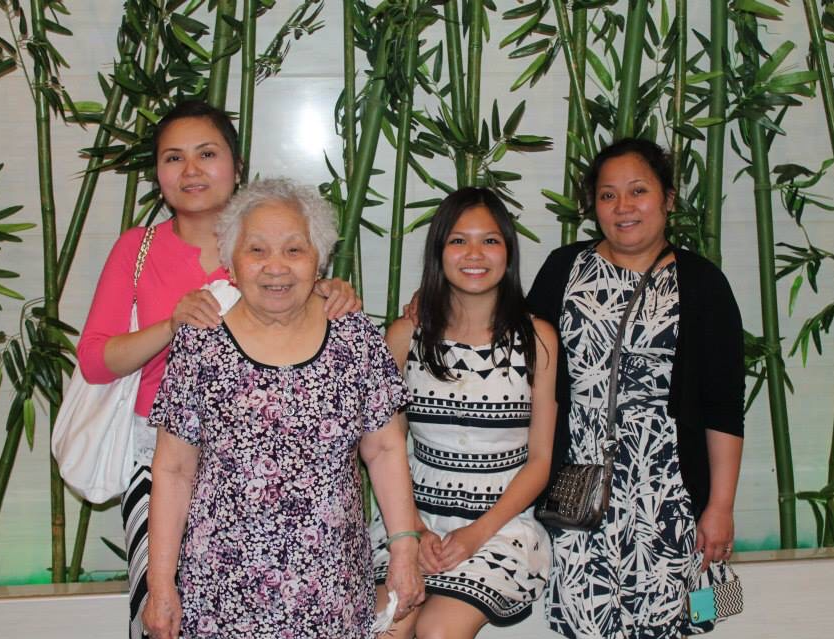
What is it? The Beyond Soundbites podcast takes a faith-informed approach to exploring the complex refugee experience. Episodes 17 and 18 explore the story of Trang Tran, who arrived to the U.S. from Vietnam as a baby thanks to the Refugee Act of 1980. Trang invites listeners to join her as she pieces her story together and seeks to understand her own family’s story. Also, many of the creators and contributors to the Beyond Soundbites podcast have long-term connections with World Relief. And they apply their own passion for welcoming immigrants and refugees to every aspect of the podcast.
Movie
Human Flow by Ai Wei Wei

What is it? Human Flow is a stunning and epic documentary film by Ai Wei Wei, an internationally renowned artist who applies his creativity to visualizing global mass displacement. Ai Wei Wei explores the tension between the enormous scale of displacement and the poignance of individual stories. And since the film was released in 2017, the global displacement crisis has only grown, which makes the film’s mission to understand the experience of displaces people and promote a belief in everyone’s unique value more relevant than ever. And through powerful visuals, interviews and stories, the film makes the global refugee crisis feel real in a very personal way.
Book
The Girl Who Smiled Beads by Clemantine Wamariya and Elizabeth Weil

What is it? This autobiography tells the story of a young woman who is a refugee and whose family fled their home when she was only six years old. Spanning years, the book traces her family’s journey through refugee camps in seven African countries until Wamariya eventually makes it to the United States as a refugee. However, the story doesn’t end there…
“It’s strange, how you go from being a person who is away from home to a person with no home at all. You are unwanted, by everyone.”
Clemantine Wamariya and Elizabeth Weil
The Girl Who Smiled Beads describes a family’s struggle to hold onto their dignity. Their fight to stay together. And the lingering trauma that lasts far past the actual violence they experienced. Even after arriving safely in the U.S., Wamariya describes wanting to challenge stereotypes and throughout the book, she pushes back. Should you see her as a poor, grateful, exotic refugee? No, she is a person of agency, feelings, and unique experience.
Article
NPR’s Goats and Soda, Stunning Photos Depict Migrants ‘As They’d Rather Be Seen’ by Malaka Gharib
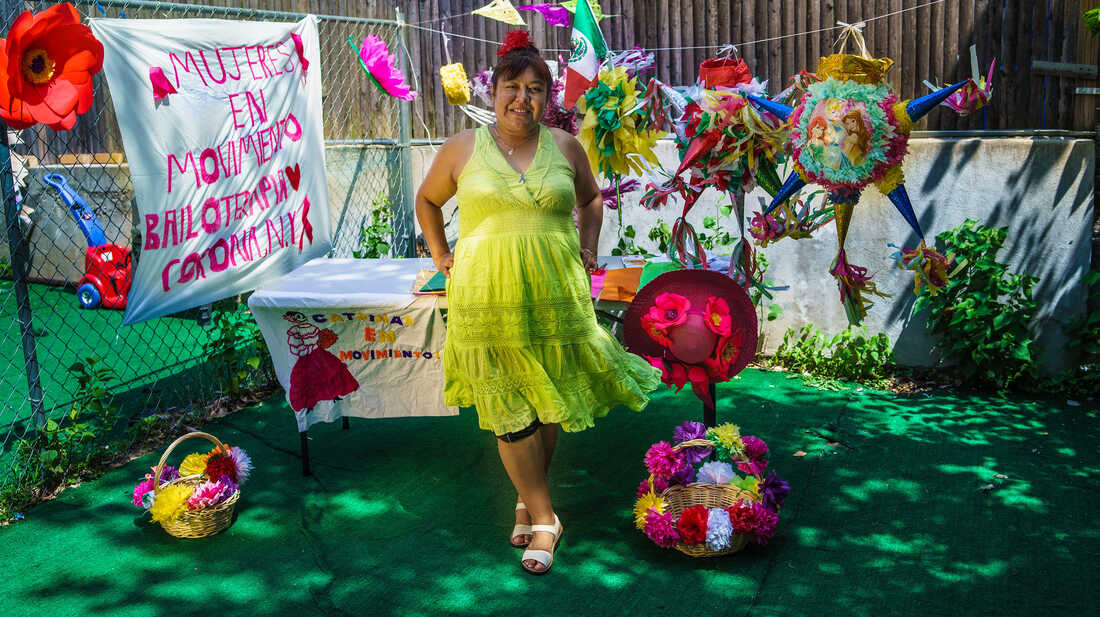
What is it? We have all seen heart-wrenching images of refugees and immigrants suffering, as oppressed and victims of violence. And in contrast, this article profiles a photo exhibit called Another Way Home. The art show provides a different narrative. It shows people how they want to be seen. And it does so by featuring 13 immigrant, migrant, and refugee photographers, artists, and storytellers and showcasing their works of art.
What will you learn next?
We hope that these resources help you connect to the stories of refugees and immigrants: people who come from different backgrounds, places, and stories but have dreams and goals for their lives. Ultimately, this is a launchpad. There are countless stories out there of people who overcame obstacles, faced incredible challenges, and are rebuilding their lives after loss and displacement. Because of that, we hope you will think of this as a starting place. Whose story will you hear next?
Continue reading:
Abdul and Yao: Story of Impact
Moving Forward with World Relief Durham
This fall, a few of World Relief Durham’s partners shared why they serve with World Relief and what it looks like for their community to move forward together. Here are some of their thoughts:
Why World Relief?
“They not only serve [the international community] well, but they love it well, and they do it from a biblical perspective and they do it holistically, which is very, very important to a person who has no idea what to do next.”
Raven Fox, ServeRDU Associate Director of Community Training, The Summit Church
“World Relief is great access to finding people that we can support as a church, and it’s also a place that gives us the tools with the training before people enter – that’s really helpful for them to be culturally sensitive and ready to help in a good, kind way!”
Andrea Tshihamba, World Relief Durham Volunteer
“I think it’s a great organization that combines our love for Jesus with love for people. I think keeping those things together is really important for us, as God’s people, and as a pastor, I’m excited that this is an organization that really shows us how to do that.”
Dave Dunderdale, Associate Pastor, Blacknall Memorial Presbyterian Church
How have you seen your community “move together” to create lasting change?
“I think Durham represents a lot of history and a lot of grit. And I feel like World Relief Durham is part of that community and when, for example, with the Afghanistan crisis, the amount of outpouring to […] donate money to help World Relief Durham to be able to serve the refugees coming in, was completely – we were all just blown away by the support of the community.”
Naoshi Yamauchi, World Relief Durham Board Member & Volunteer
“We’ve seen more and more people thinking through what skill set or what gifting they have and how they can leverage that. […] One [example] around housing: some people who own a variety of rental units, and have been thinking how could they make them affordable; make them affordable especially to refugees who are just getting here. Maybe you have no credit history; maybe you can’t afford market rate. So they’re able to offer them at affordable rates, and be able to work with them to build credit and to be able to eventually move towards owning their own homes.”
KJ Hill, Pastor of Community Development and Outreach, The Summit Church
Interviews collected by Karen Spencer, U.S. Marketing Partner, World Relief, and Rachel Clair, Content Manager, World Relief.











